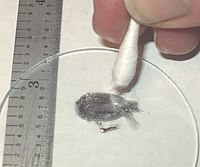
Photo from wikipedia
Abstract Point-of-care testing for health and environmental monitoring sometimes requires the detection of specific molecules in liquid media to provide a diagnosis in a resource-limited or outdoor environment. Thus, it… Click to show full abstract
Abstract Point-of-care testing for health and environmental monitoring sometimes requires the detection of specific molecules in liquid media to provide a diagnosis in a resource-limited or outdoor environment. Thus, it is significant to develop portable and self-powered sensor systems to enable in-situ detection of analytes in liquids. Triboelectric nanogenerator (TENG) and microfluidic devices are two nascent technologies that can be used for point-of-care testing. Furthermore, the combination of these technologies is proposed as an attractive research strategy to achieve portable sensors by using the electrical signals generated during the mechanical interactions between the test solution and the device. Herein, a portable TENG-based microfluidic self-powered sensor system is demonstrated. The system consists of a triboelectric microfluidic (TEMF) device, which generates a voltage in response to the target analyte solution flowing through the microchannel. The viability and versatility of this device are illustrated for ionic concentration measurements, as well as in-situ monitoring for the catalytic reduction of an industrial pollutant, 4-nitrophenol (4-NP). The results verify that the proposed sensor system has the potential for application in the field of self-powered chemical sensors for environmental monitoring and analytical chemistry.
Journal Title: Nano Energy
Year Published: 2021
Link to full text (if available)
Share on Social Media: Sign Up to like & get
recommendations!